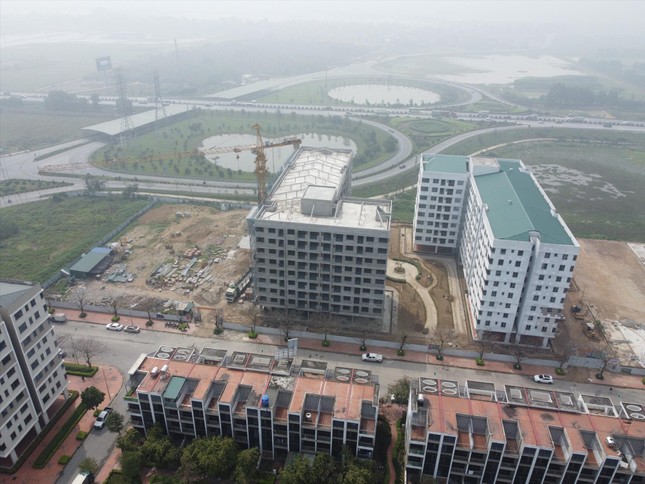Gói 120.000 tỷ đồng giải ngân ‘tốc độ rùa’: Lỗi tại ai?
The 120 trillion VND disbursement package: Whose fault is the slow process?

The State Bank of Vietnam (SBV) recently organized a conference in Hanoi to accelerate the implementation of a 120 trillion VND program for lending to social housing, worker housing, renovation projects, and condominium construction. Deputy Governor of the SBV, Dao Minh Tu, and Deputy Minister of Construction, Nguyen Van Sinh, were the chairpersons of the conference.
Limited supply and slow disbursement
According to Deputy Governor Dao Minh Tu, the 120 trillion VND credit package is funded by commercial banks. Therefore, the lending and disbursement process is aimed at achieving the objectives and targeting social housing, worker housing, and low-income individuals.
“This support package is designed to serve the goal of building one million social housing units, therefore, the disbursement process may take a few years. However, projects that meet the conditions should be disbursed immediately,” emphasized Deputy Governor Tu.
The main difficulty and bottleneck in implementing the credit package is the limited supply of social housing. Credit institutions, through project access and appraisal, have found that some projects face legal obstacles, land clearance issues, land use payment procedures, and land use change purposes. Many projects are still in the foundation construction phase, in the process of selecting contractors, have not yet started construction, or are still clearing the site, making them ineligible to sell their products.
To date, 28 out of 63 provincial People’s Committees have submitted documents or published information on the electronic portal regarding the list of projects participating in the program, totaling 68 projects. Some provinces that have announced multiple projects include Hanoi (6 projects), Ho Chi Minh City (6 projects), Bac Ninh (6 projects), Binh Dinh (5 projects), among others. Out of the 68 projects in 28 provinces and cities, 30 projects have a demand for loans, while the remaining projects have already been completed or have secured funding from other sources.
Out of the 30 projects with loan demand, commercial banks have committed to providing credit for 15 projects with a total committed amount of around 7,000 trillion VND.
Le Ngoc Lam, the CEO of BIDV Bank, stated that their credit has been negative, with more than 1% since the beginning of the year. The bank is actively seeking customers. Regarding the 120 trillion VND package, BIDV has accessed 8 projects, approved 4 projects with a total debt of nearly 1,000 trillion VND, and disbursed more than 96 trillion VND. The reason for the slow disbursement is that many businesses want to finance their projects with their own capital first and are not yet willing to borrow from banks.
Similarly, Phung Thi Binh, Deputy CEO of Agribank, stated that the bank has signed credit agreements with 8 social housing projects, committing to lend 2,500 trillion VND and disbursing 400 trillion VND. Currently, the bank is accessing 5 new projects with a total loan amount of around 2,000 trillion VND. According to Binh, one of the reasons for the slow disbursement of the 120 trillion VND package is that many projects encounter legal issues and have a narrow target market for social housing.
High interest rates, Companies complain
During the conference, many companies raised issues and obstacles they encountered during the implementation of social housing projects as well as the 120 trillion VND credit package. Nguyen Tuan Anh, Deputy CEO of Vietnam Urban and Housing Development Corporation, mentioned that in some big cities like Hanoi and Ho Chi Minh City, there are very few social housing projects, and the implementation process is too long. To quickly disburse the 120 trillion VND capital source, localities should allocate clean land for project implementation and development to attract investment and accelerate disbursement.
For commercial banks, the loan process is prolonged due to the need for project effectiveness appraisal. Therefore, Nguyen Tuan Anh suggested that this process should be bypassed since social housing projects that have been developed have clear regulations that allow investors to earn 10% profit on the total project cost.
Taking a more realistic approach, a representative from the Duc Manh Joint Stock Company in Da Nang pointed out that there are administrative procedures for building and buying social housing that are still problematic. The interest rate for the 120 trillion VND package is still high, ranging from 7% to 8.2% per year.
“This interest rate difference is not significant compared to regular interest rates. Therefore, banks should consider lowering the interest rate even further to encourage businesses to borrow,” the representative suggested.
In another note, Deputy Minister of Construction, Nguyen Van Sinh, revealed that the Ministry of Construction is requesting localities to report on the implementation of the 120 trillion VND package in order to identify difficulties and find solutions. The ministry will also discuss with the SBV to review the difficulties faced by investors and homebuyers during the loan and disbursement process.
According to the statistics provided by the SBV, BIDV has disbursed 95.7 billion VND for three project investors in the provinces of Phu Tho, Thanh Hoa, and Binh Duong. Vietinbank has disbursed 128.6 billion VND for one project investor in An Giang province and 0.4 billion VND for homebuyers in another project. Agribank has disbursed 415.7 billion VND for four project investors in the provinces of Bac Ninh, Quang Ninh, and Kien Giang, and 5.7 billion VND for homebuyers in two projects.
This article was written for Business Today.
